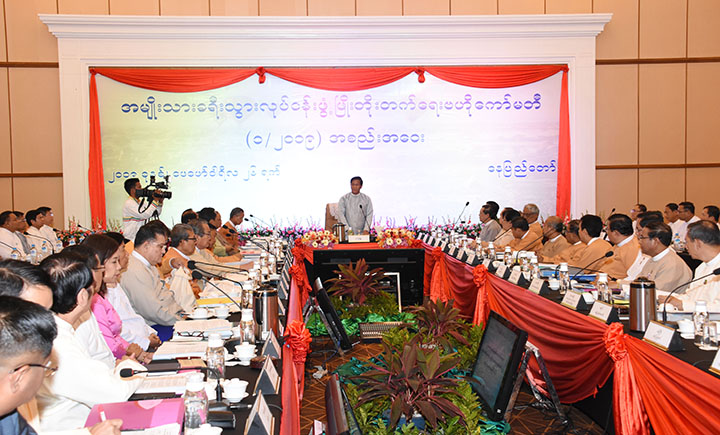To step up efforts for tourism development in Myanmar, the Union Government will form three committees that will steer the decentralization of tourism services in accordance with the new tourism law, said Vice President U Henry Van Thio.
He made the remarks in his capacity as the Chairman of the National Tourism Development Central Committee at the first meeting of the committee in Nay Pyi Taw yesterday.
“The old law, which was enacted in 1993 and practiced for about 25 years, allows only the government to manage hotels and tourism services, as the situation demanded in those years,” said the Vice President.
“The new law aims at allowing the private sector to operate hotels and tourism services. The new law is in conformity with the changing situation in the world and the country’s decentralization program, and it will give regions and states, including the Nay Pyi Taw Council Area, the power to manage hotels and tourism services,” he said.
The central committee chaired by Vice President U Henry Van Thio was formed by the Union Government under Notification 4/2019, in accordance with the Myanmar Tourism Law, which was enacted on 17 September, 2018.
The new central committee includes six intellectuals and private sector representatives.
Three committees will soon be formed in accordance with the new law. The National Tourism Development Committee will lay down policies and projects. Another committee, named the Tourism Committee, will coordinate between departments and organizations and develop tourist attractions and promote tourism nationwide. A regional committee will take over the task carried out by the ministry previously and will coordinate between government departments and private tourism services in the respective regions and states, and it will be responsible for the security and safety of travellers.
“The new law demands greater cooperation and coordination between the departments and the private sector for the development of tourism, and it also serves as a foundation of the tourism sector for our future federal democratic Union,” said U Henry Van Thio.

The Vice President also urged union ministers and chief ministers, who are also members of the central committee, to make concerted efforts for the development of tourism.
“As the Hotels and Tourism Ministry shares its power, the regional authorities need to improve hotel and tourism services so they meet international standards, set uniform rules and regulations throughout the country, promote the tourist attractions of Myanmar, and develop human resources in the tourism sector,” said the Vice President.
He urged local authorities to coordinate with each other during the transition period as power is transferred from the Ministry of Hotels and Tourism to regional authorities, as the rules and regulations of the new law have not yet come out.
The Vice President urged the participants of the meeting to discuss issues which need to be prioritized, in accordance with the new tourism law. Myanmar has been granting visa exemptions to visitors from Japan, Republic of Korea, Hong Kong, and Macau, as well as visa-on-arrival to Chinese and Indian air travellers.
Thanks to the new scheme, tourist arrivals in Myanmar in 2018 exceeded 3.55 million, an increase of 3.5 per cent compared with 2017, when the country welcomed 3.44 million tourists.
The Vice President also suggested the regional and state authorities to promote community-based tourism, ensure sustainable development of existing tourist attractions, explore more travel destinations, invite local and foreign investment into the tourism sector, lay down and implement a modern marketing system, and promote cooperation between the government and private sectors.
Afterwards, Union Minister for Hotels and Tourism U Ohn Maung discussed rules and regulations of the new tourism law, cooperation with governmental departments concerned in developing infrastructure, uplifting standards of accommodation, granting business license, cleanliness of travel destinations, conservation of cultural heritage, promoting traditional food and health care and security.
Members of the central committee Union minsters Lt-Gen Kyaw Swe, U Thant Sin Maung, U Thein Swe and Dr. Myint Htwe discussed matters related to security, direct flight to destinations, granting visa, opening border check points, granting visa exemption and providing health care services to tourists.
Following discussions by participants of the meeting, the Vice President called on the Union government, region and state governments and organizations related with tourism to cooperating with each other to be able to make the best use of the country’s existing tourism resources.
He also urged to draw a Master Plan for tourism development to achieve success in the drive.—MNA
(Translated by Zaw Min)


